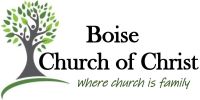The Broken Hallelujah:
The Brokenness of This Present Age
Sunday, we will conclude our lesson series on The Broken Hallelujah. These lessons were intended to be a necessary corrective to an insidious triumphalism that has permeated much of our Christian thinking. This is not a denial that God will not triumph in the end or that Christians will not participate in that victory. This is a repudiation of an over-realized eschatology that views the Christian life as free from the struggle against sin, suffering, poverty, or any other moral or physical evil.
Check out our church blog (https://boisecoc.org/blog/), or sermon archive (https://boisecoc.org/sermons) for previous articles and sermons from this series.
In this final installation we will examine The Brokenness of this Present Age.
The Brokenness Now
Human Sinfulness, Now
Romans 3:23 For all have sinned and fall short of the glory of God
Psalm 14:1 The fool says in his heart, “There is no God.” They are corrupt, their deeds are vile; there is no one who does good.
Separation from God, Now
Isaiah 59:2 But your iniquities have separated you from your God; your sins have hidden his face from you, so that he will not hear.
Curse on Creation, Now
Romans 8:20-22 For the creation was subjected to frustration, not by its own choice, but by the will of the one who subjected it, in hope that the creation itself will be liberated from its bondage to decay and brought into the freedom and glory of the children of God. We know that the whole creation has been groaning as in the pains of childbirth right up to the present time.
Genesis 3:17-19 To Adam he said, “Because you listened to your wife and ate fruit from the tree about which I commanded you, ‘You must not eat from it,’ “Cursed is the ground because of you; through painful toil you will eat food from it all the days of your life. It will produce thorns and thistles for you, and you will eat the plants of the field. By the sweat of your brow you will eat your food until you return to the ground, since from it you were taken; for dust you are and to dust you will return.”
Death and Decay, Now
Romans 6:23 For the wages of sin is death, but the gift of God is eternal life in Christ Jesus our Lord.
Romans 5:12 Therefore, just as sin entered the world through one man, and death through sin, and in this way death came to all men, because all sinned–
Suffering and Injustice, Now
Psalm 10:2-4 In his arrogance the wicked man hunts down the weak, who are caught in the schemes he devises. He boasts of the cravings of his heart; he blesses the greedy and reviles the Lord. In his pride the wicked does not seek him; in all his thoughts there is no room for God.
Resolution in Eternity
Human Sinfulness, Resolution in Eternity
Revelation 21:27 Nothing impure will ever enter it, nor will anyone who does what is shameful or deceitful, but only those whose names are written in the Lamb’s book of life.
Separation from God, Resolution in Eternity
Revelation 21:3 And I heard a loud voice from the throne saying, “Look! God’s dwelling place is now among the people, and he will dwell with them. They will be his people, and God himself will be with them and be their God.
Curse on Creation, Resolution in Eternity
Revelation 22:3 No longer will there be any curse. The throne of God and of the Lamb will be in the city, and his servants will serve him.
Death and Decay, Resolution in Eternity
Revelation 21:4 ‘He will wipe every tear from their eyes. There will be no more death’ or mourning or crying or pain, for the old order of things has passed away.’
Suffering and Injustice, Resolution in Eternity
2 Peter 3:13 But in keeping with his promise we are looking forward to a new heaven and a new earth, where righteousness dwells.
Revelation 7:17 For the Lamb at the center of the throne will be their shepherd; ‘he will lead them to springs of living water.’ ‘And God will wipe away every tear from their eyes.’
Please join us! — Joey
